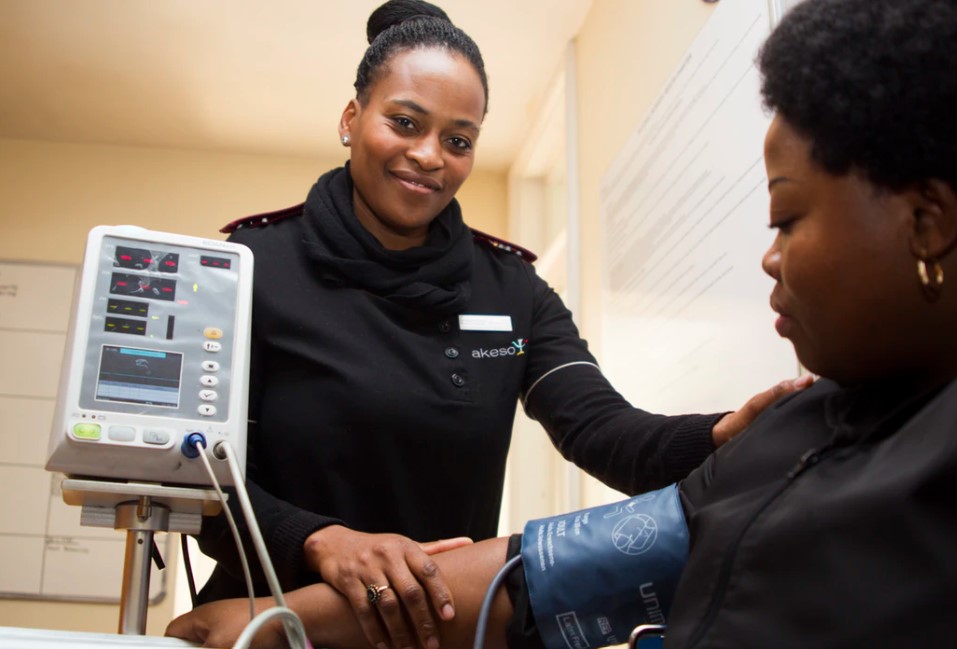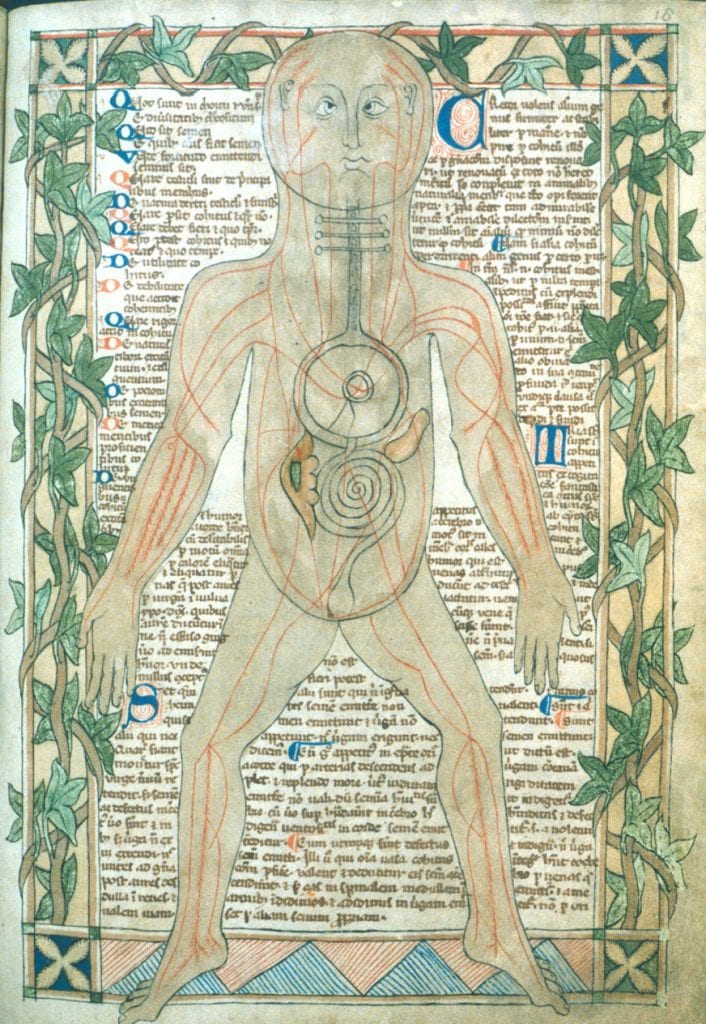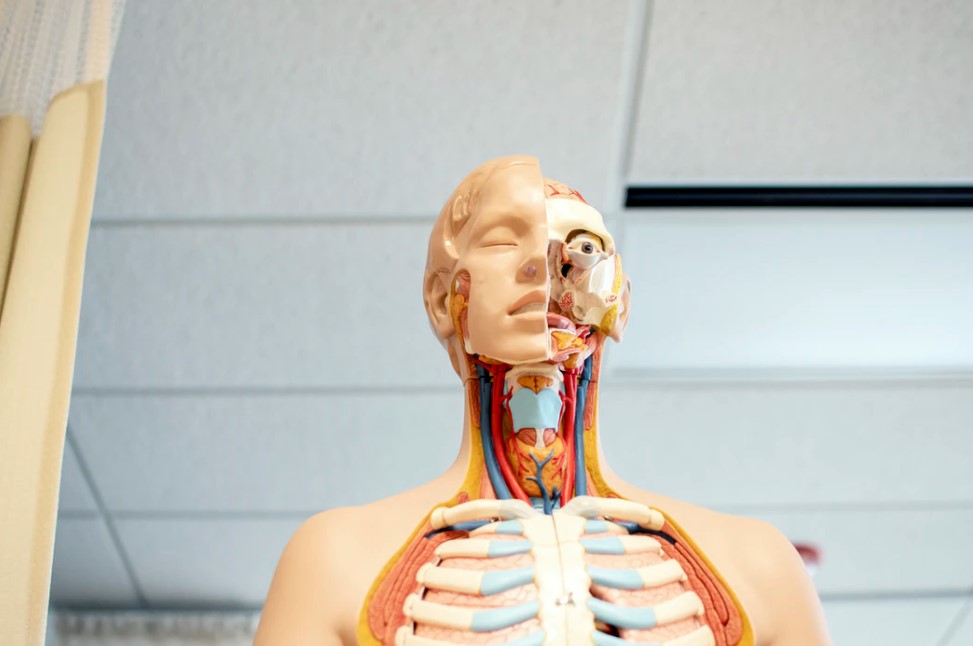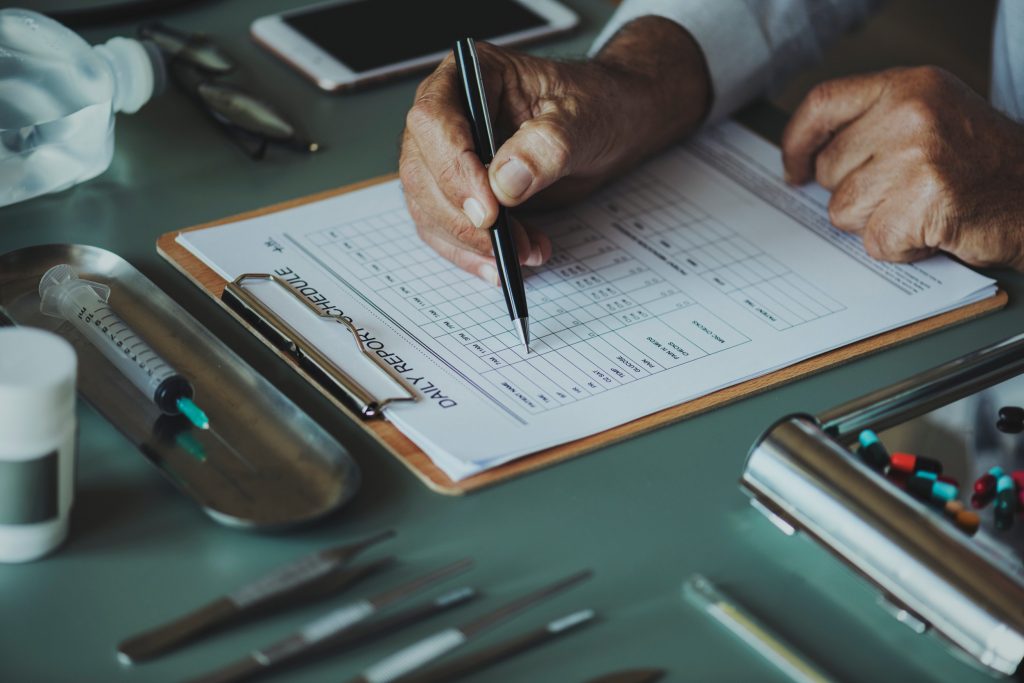Understanding medical terminology isn’t just for doctors and nurses. If you work in the healthcare industry, having a strong command of medical language is vital to your job performance.
Regardless of whether you spend your days at patients’ bedsides or never step foot into a medical clinic, a solid understanding of medical terminology allows all healthcare professionals to understand each other and communicate effectively.
What Is Medical Terminology?

Medical terminology is the standardized means of communication used within the healthcare industry to describe symptoms, diagnoses, and procedures.
By normalizing clinical language — enabling everyone involved in a patient’s treatment and care to perform more efficiently — medical terminology ensures a better outcome for the patient.
Often, especially within the clinical environment, medical terminology is communicated as abbreviations, and understanding this documentation makes the entire process run much faster and smoother.
Where Did Medical Terminology Come From?

Modern medical terminology originated between the 14th and 17th centuries when people began studying anatomy. Practicing in Renaissance-era medical schools, early Italian anatomists and physicians used Latin to describe various parts of the anatomy. The naming conventions have remained in place since.
However, the oldest sources of Western medicine are the Hippocratic writings (5th and 4th centuries B.C.), which also contain many medical terms. They are responsible for the Greek language’s influence on modern medical terminology.

During the Islamic Golden Age, scholars translated medical texts from Greece and India into Arabic. They did so to make the traditions more accessible, understandable, and teachable. While Islamic scholars made original contributions to medical literature, few Arabic terms found their way into Western medicine’s vernacular.
By the time of the Renaissance (when Greek was no longer widely understood), scholars translated both Greek and Arabic medical works into Latin, and the era of medical Latin began.
Today, English is the language of choice for medical terminology. Not only are influential medical journals written in English, but it is also the language of choice at international conferences. Once again, medical doctors have chosen a single language for international communication, just as they did with medical Latin hundreds of years ago.
Composition of Medical Terms

When describing a patient’s physical condition and disease, precision is essential. Modern medical terminology provides that required specificity. Today’s medical terminology system allows healthcare providers from all over the world to communicate and correspond in one universal language.
Since most medical terms derive from Greek and Latin, there is also a systematic methodology for each word: a prefix, root word, and suffix. The best way to learn medical terminology is to become familiar with the structure and the most commonly used components.
Medical Terminology Rules

While there are no official rules for building medical terms, there are general guidelines you can follow.
- Medical terms are made up of a minimum of one root word, that doesn’t mean there is a maximum, there can be more than one
- Prefixes end in vowels (or vowel sounds)
- Suffixes refer to procedures, disease processes, or conditions.
- Medical terms don’t require a suffix or prefix.
- Root words end in vowels
- The vowels “o” and “i” can link root words
- Take for example, the term electrocardiogram. This multi-part word uses three root words joined by “0” in two places: electr – cardi – gram. This term directly translates to “a record of the heart’s electricity”. Each piece fits together, heart is “cardi”, gram means “a record of,” and of course the beginning of the word means electricity.
- Always match Latin or Greek prefixes to the same suffixes. Latin to Latin, Greek to Greek.
Medical Terminology Prefixes and Suffixes

Placed at the beginning (prefix) and end (suffix) of a root word, prefixes and suffixes change a root word’s meaning.
Prefixes and suffixes usually have an “o,” that almost always acts as a joint connecting two root words that meet at a consonant (for example, arthr -o- logy = arthrology). However, the “o” is dropped when connecting to a vowel, as with arthr + itis = arthritis (vs. arthr -o- itis).
Complete List of Essential Medical Terminology Prefixes and Suffixes
Prefixes are indicated by an ending dash, where they join root words. Suffixes by a leading dash.
A
- a-, an-: not, without
- ab-: from, away from
- abdomin-: of or relating to the abdomen
- -ac: pertaining to, one afflicted with
- acanth-: thorn or spine
- acou-: of or relating to hearing
- acr-: extremity, top-most
- -acusis: hearing
- -ad: toward, in the direction of
- ad-: at, increase, on, toward
- aden-: of or relating to a gland
- adip-: of or relating to fat or fatty tissue
- adren-: of or relating to the adrenal glands
- -aemia: blood condition
- aer(o)-: air, gas
- aesthesi-: sensation
- -al: pertaining to
- alb-: denoting a white or pale color
- -algia, alg(i)o-: pain
- all-: denoting something as different
- ambi-: denoting something as positioned on both sides
- amnio-: pertaining to the membranous fetal sac
- amph(i)-: on both sides
- amylo-: starchy, carbohydrate-related
- an-: not, without
- ana-: back, again, up
- an-: anus
- andr-: pertaining to a man
- angi-: blood vessel
- aniso-: describing something as unequal
- ankyl-, ancyl-: denoting something as crooked or bent
- ante-: describing something as positioned in front of another thing
- anti-: describing something as “against” or “opposed to” another
- apo-: away, separated from, derived from
- archi-: first, primitive
- arsen(o)-: of or pertaining to a male, masculine
- arteri(o)-: of or pertaining to an artery
- arthr-: of or pertaining to the joints, limbs
- articul-: joint
- -ary: pertaining to
- -ase: enzyme
- -asthenia: weakness
- atel(o)-: imperfect, incomplete development
- ather-: fatty deposit, soft gruel-like deposit
- -ation: process
- atri-: an atrium (specifically the heart atrium)
- aur-: of or pertaining to the ear
- aut-: self
- aux(o)-: increase; growth
- axill-: of or pertaining to the armpit
- azo(to)-: nitrogenous compound
B
- bacillus: rod-shaped
- bacteri-: pertaining to bacteria
- balan-: of the glans penis or glans clitoridis
- bas-: of or pertaining to base
- bi-: twice, double
- bio-: life
- blast-: germ or bud
- blephar(o)-: of or pertaining to the eyelid
- brachi(o)-: of or relating to the arm
- brachy-: short, little
- brady-: slow
- bronch(i)-: of or relating to the bronchus
- bucc(o)-: of or pertaining to the cheek
- burs(o)-: bursa (fluid sac between the bones)
C
- capill-: of or pertaining to hair
- capit-: pertaining to the entire head
- carcin-: cancer
- cardi-: of or pertaining to the heart
- carp-: of or pertaining to the wrist
- cata-: down, under
- -cele: pouching, hernia
- -centesis: a surgical puncture for aspiration
- cephal(o)-: of or pertaining to the head (as a whole)
- cerat(o)-: of or pertaining to the cornu, a horn
- cerebell(o)-: of or pertaining to the cerebellum
- cerebr-: of or pertaining to the brain
- cervic-: of or pertaining to the neck or the cervix
- cheil-: of or pertaining to the lips
- chem-: chemistry, drug
- chir-, cheir-: of or pertaining to the hand
- chol(e)-: of or pertaining to bile
- cholecyst(o)-: of or pertaining to the gallbladder
- chondr(i)o-: cartilage, gristle, granule, granular
- chrom(ato)-: color
- -cidal, -cide: killing, destroying
- cili-: of or pertaining to the cilia, the eyelashes; eyelids
- circum-: denoting something as ‘around’ another
- cis-: on this side
- clast: break
- clostr-: spindle
- co-: with, together, in association
- coccus: round, spherical
- col-, colo-, colono-: colon
- colp(o)-: of or pertaining to the vagina
- com-: with, together
- contra: against
- cor-: with, together
- cor-: of or pertaining to the eye’s pupil
- cord(i)-: of or pertaining to the heart
- cornu-: applied to describing processes and parts of the body as likened or similar to horns
- coron(o)-: pertaining to the heart
- cortic(o)-: cortex, outer region
- cost-: of or pertaining to the ribs
- cox-: of or relating to the hip, haunch, or hip-joint
- crani(o)-: belonging or relating to the cranium
- -crine, crin(o): to secrete
- cry(o)-: cold
- cutane-: skin
- cycl-: circle, cycle
- cyph(o)-: denotes something as bent
- cyst(o)-, cyst(i)-: of or pertaining to the urinary bladder
- cyt(o)-, -cyte: cell
D
- dacry(o)-: of or pertaining to tears
- -dactyl(o)-: of or pertaining to a finger, toe
- de-: from, down, or away from
- dent-: of or pertaining to teeth
- dermat(o)-, derm(o)-: of or pertaining to the skin
- -desis: binding
- dextr(o)-: right, on the right side
- di-: two, apart, separation
- dia-: through, during, across
- dif-: apart, separation
- digit-: of or pertaining to the finger
- diplo-: two-fold
- -dipsia: thirst (the condition of)
- dis-: separation, taking apart
- dors(o)-, dors(i)-: of or pertaining to the back
- dromo-: running, conduction, course
- duodeno-: twelve
- dura-: hard
- dynam(o)-: force, energy, power
- -dynia: pain
- dys-: bad, difficult, defective, abnormal
E
- -eal: pertaining to
- ec-: out, away
- ect(o)-: outer, outside
- -ectasia, -ectasis: expansion, dilation
- -ectomy: denotes a surgical operation or removal of a body part, resection, excision
- -emesis: vomiting condition
- -emia: blood condition
- encephal(o)-: of or pertaining to the brain
- endo-: denotes something as inside or within
- eosin(o)-: having a red color
- enter(o)-: of or pertaining to the intestine
- epi-: on, upon
- episi(o)-: of or pertaining to the pubic region, the loins
- -esophageal, -esophago-: gullet
- esthesio-: sensation
- eu-: true, good, well, new
- ex-: out of, away from
- exo-: denotes something as “outside” another
- extra-: outside
F
- faci-: of or pertaining to the face
- fibr-: fiber
- fil-: fine, hair-like
- foramen: hole, opening, or aperture, particularly in bone
- -form: used to form adjectives indicating “having the form of”
- fore-: before or ahead
- fossa: a hollow or depressed area; a trench or channel
- front-: of or pertaining to the forehead
G
- galact(o)-: milk
- gastr(o)-: of or pertaining to the stomach
- -gen: born in, from, of a certain kind
- -genic: formative, pertaining to producing
- genu-: of or pertaining to the knee
- -geusia: taste
- gingiv-: of or pertaining to the gums
- glauc(o)-: having a grey or bluish-grey color
- gloss(o)-, glott(o)-: of or pertaining to the tongue
- gluco-: sweet
- glyc(o)-: sugar
- gnath(o)-: of or pertaining to the jaw
- -gnosis: knowledge
- gon(o)-: seed, semen, reproductive
- -gram, -gramme: record or picture
- -graph: instrument used to record data or picture
- -graphy: process of recording
- gyno-, gyneco-: woman
H
- halluc-: to wander in mind
- hemat-, haemato- (haem-, hem-): of or pertaining to blood
- hema- or hemo-: blood
- hemangi or hemangio-: blood vessels
- hemi-: one-half
- hepat- (hepatic-): of or pertaining to the liver
- heter(o)-: denotes something as “the other” (of two), as an addition, or different
- hidr(o)-: sweat
- hist(o)-, histio-: tissue
- home(o)-: similar
- hom(o)-: denotes something as “the same” as another or common
- humer(o)-: of or pertaining to the shoulder
- hydr(o)-: water
- hyper-: extreme or beyond normal
- hyp(o)-: below normal
- hyster(o)-: of or pertaining to the womb or the uterus
I
- -iasis: condition, formation, or presence of
- iatr(o)-: of or pertaining to medicine or a physician (uncommon as a prefix but common as a suffix; see -iatry)
- -iatry -iatry: denotes a field in medicine emphasizing a certain body component
- -ic: pertaining to
- -ics: organized knowledge, treatment
- idio-: self, one’s own
- ileo-: ileum
- infra-: below
- inter-: between, among
- intra-: within
- ipsi-: same
- irid(o)-: of or pertaining to the iris
- isch-: restriction
- ischio-: of or pertaining to the ischium, the hip-joint
- -ism: condition, disease
- -ismus: spasm, contraction
- iso-: denoting something as being equal
- -ist: one who specializes in
- -ite: the nature of, resembling
- -itis: inflammation
- -ium: structure, tissue
J-K
- juxta (iuxta): near to, alongside, next to
- kal-: potassium
- kary-: nucleus
- kerat-: cornea (eye or skin)
- kine-: movement
- koil-: hollow
- kyph-: humped
L
- labi-: of or pertaining to the lip
- lacrim(o)-: tear
- lact(i)-, lact(o): milk
- lapar(o)-: of or pertaining to the abdominal wall, flank
- laryng(o)-: of or pertaining to the larynx, the lower throat cavity where the voice box is
- latero-: lateral
- lei(o)-: smooth
- -lepsis, -lepsy: attack, seizure
- lept(o)-: light, slender
- lingu(a)-, lingu(o)-: of or pertaining to the tongue
- lip(o)-: fat
- liss(os)-: smooth
- lith(o)-: stone, calculus
- log(o)-: speech
- -logist: denotes someone who studies a certain field, a specialist, one who treats
- -logy: denotes the academic study or practice of a certain field, the study of
- lumb(o)-, lumb(a)-: of or relating to the part of the trunk between the lowest ribs and the pelvis
- lymph(o)-: lymph
- lys(o)-, -lytic: dissolution
- -lysis: destruction, separation
M
- macr(o)-: large, long
- -malacia: softening
- mamm(o)-: of or pertaining to the breast
- mammill(o)-: of or pertaining to the nipple
- manu-: of or pertaining to the hand
- mast(o)-: of or pertaining to the breast
- meg(a)-, megal(o)-, -megaly: enlargement, million
- melan(o)-: having a black color
- melos: extremity
- mening(o)-: membrane
- men-: month, menstrual cycle
- mer-: part
- mes-: middle
- met, meta-: after, beside, beyond or change
- -meter: instrument used to measure or count
- -metry: process of measuring
- metr-: pertaining to conditions or instruments of the uterus
- micr-: millionth, denoting something as small, relating to smallness
- milli-: thousandth
- mon-: single
- morph-: form, shape
- muscul(o)-: muscle
- my(o)-: of or relating to muscle
- myc(o)-: fungus
- myel(o)-: of or relating to bone marrow or the spinal cord
- myl(o)-: of or relating to molar teeth or the lower jaw
- myri-: ten thousand
- myring(o)-: eardrum
- myx(o): mucus
N
- nan(o)-: dwarf, small
- narc(o)-: numb, sleep
- nas(o)-: of or pertaining to the nose
- necr(o)-: death
- neo-: new
- nephr(o)-: of or pertaining to the kidney
- nerv-: of or pertaining to nerves and the nervous system
- neur(i)-, neur(o)-: of or pertaining to nerves and the nervous system
- noci-: pain, injury, hurt
- normo-: normal
O
- ocul(o)-: of or pertaining to the eye
- odont(o)-: of or pertaining to teeth
- odyn(o)-: pain
- -oid: resemblance to
- ole: small, little
- olig(o)-: having little, having few
- om(o)-: shoulder
- -oma(singular), -omata (plural): tumor, mass, fluid collection
- omphal(o)-: of or pertaining to the navel, the umbilicus
- onco-: tumor, bulk, volume
- onych(o)-: of or pertaining to the nail of a finger or toe
- oo-: of or pertaining to an (egg), a woman’s egg, the ovum
- oophor(o)-: of or pertaining to the woman’s ovary
- ophthalm(o)-: of or pertaining to the eye
- opistho-: back, behind, rear
- -opsy: examination or inspection
- optic(o)-: of or relating to chemical properties of the eye
- or(o)-: of or pertaining to the mouth
- -or: one who, agent
- orchi(o)-, orchid(o)-, orch(o)-: testis
- orth(o)-: denoting something as straight or correct
- -osis: a condition, disease or increase
- ossi-, osse-: bone, bony
- ost(e)-, oste(o)-: bone
- ot(o)-: of or pertaining to the ear
- -ous: pertaining to
- ovari(o)-: of or pertaining to the ovaries
- ovo-, ovi-, ov-: of or pertaining to the eggs, the ovum
- oxo-: addition of oxygen
- oxy-: sharp, acid, acute; oxygen
P
- pachy-: thick
- palpebr-: of or pertaining to the eyelid
- pan-, pant(o)-: denoting something as complete or containing everything, all
- papill-: of or pertaining to the nipple of the chest/breast
- papul(o)-: indicates
papulosity, a small elevation or swelling in the skin, a pimple, swelling - para-: alongside of
- -paresis: slight paralysis
- parvo-: small
- path(o)-: disease
- -pathy: denotes a disease, or disorder
- pauci-: few
- pector-: breast or chest
- ped-, -ped-, -pes: of or pertaining to the foot
- ped-, pedo-: of or pertaining to the child
- pelv(i)-, pelv(o)-: hip bone
- -penia: deficiency
- peo-: of or pertaining to the penis
- -pepsia: denotes something relating to digestion or the digestive tract
- per-: through
- peri-: denoting something with a position “surrounding” or “around” another
- -pexy: fixation
- phaco-: lens-shaped
- -phagia, -phage: denoting conditions relating to eating or ingestion
- -phago-: eating, devouring
- phall-: phallus
- pharmac-: drug, medication
- pharyng-: of or pertaining to the pharynx, the upper throat cavity
- -phil(ia): attraction for
- phleb-: of or pertaining to the blood veins, a vein
- -phobia: exaggerated fear, sensitivity, aversion
- phon-: sound
- phot-: of or pertaining to light
- phren-, phrenic-: the mind
- phyllo-: leaf-like
- -phyte, phyto-: to grow
- pia: soft
- piri-: pear
- -plasia: formation, development
- -plasty: surgical repair, reconstruction
- -plegia: paralysis
- pleio-: more, excessive, multiple
- pleur-: of or pertaining to the ribs
- -plexy: stroke or seizure
- pne-, pneum-: air, breath, lung
- pod-, -pod-, -pus: of or pertaining to the foot
- -poiesis: production
- poly-: denotes plurality
- por-: pore, porous
- post-: denotes something as after or behind another
- pre-: denotes something as before another
- presby-: old age
- prim-: denotes something as first or most-important
- pro-: denotes something as before’ another
- proct-: anus, rectum
- prosop-: face
- prot-: denotes something as first or most important
- pseud-: denotes something false or fake
- psor-: itching
- psych-: of or pertaining to the mind
- ptero-, ptery-: pertaining to a wing, wing-shaped
- -ptosis: falling, drooping, downward placement, prolapse
- -ptyal-, ptyalo: saliva, salivary glands
- -ptysis: spitting
- pulmon-, pulmo-: of or relating to the lungs
- py-: pus
- pyel-: pelvis
- pykno-: to thicken
- pylor-: gate
- pyr-: fever
Q-R
- quadr(i)-: four
- radi-: radiation
- radic-: the beginning
- re-: again, back
- rect-: rectum
- ren-: of or pertaining to the kidney
- reticul(o)-: net
- retro-: backward, behind
- rhabd(o)-: rod-shaped, striated
- rhachi(o)-: spine
- rhin(o)-: of or pertaining to the nose
- -rrhage, -rrhagia: to burst forth, flow rapidly
- -rrhaphy: surgical suturing
- -rrhea: flowing, discharge
- -rrhexis: rupture
- rubr(o)-: of or pertaining to the red nucleus of the brain
- -rupt: break or burst
S
- salping(o)-: of or pertaining to tubes
- sangui-, sanguine-: of or pertaining to blood
- sarco-: muscular, flesh-like
- schist(o)-: split, cleft
- schiz(o)-: denoting something split or double-sided
- scler(o)-: hard
- -sclerosis: hardening
- scoli(o)-: twisted
- -scope: an instrument for viewing
- -scopy: use of an instrument for viewing
- scoto-: darkness
- semi-: one-half, partly
- sial(o)-: saliva, salivary gland
- sigmoid(o)-: sigmoid, S-shaped curvature
- sinistr(o)-: left, left side
- sinus-: of or pertaining to the sinus
- sito-: food, grain
- somat(o)-, somatico-: body, bodily
- somn(o): sleep
- -spadias: slit, fissure
- spasmo-: spasm
- sperma-, spermo-, spermato-: semen
- splanchn(i)-, splanchn(o)-: viscera
- splen(o)-: spleen
- spondyl(o)-: of or pertaining to the spine, the vertebra
- squamos(o)-: denoting something as full of scales or scaly
- -stalsis: contraction
- -stasis: stopping, standing
- -staxis: dripping, trickling
- sten(o)-: denoting something as narrow in shape, pertaining to narrowness
- -stenosis: abnormal narrowing of a blood vessel (or other tubular organ or structure)
- steth-: of or pertaining to the upper chest (the area above the breast and under the neck)
- stheno-: strength, force, power
- stom-, stomat-: of or pertaining to the mouth, an artificially created opening
- -stomy: creation of an opening
- sub-: beneath, under
- super-: in excess, above, superior
- supra-: above, excessive
- sy, syl-, sym-, syn-, sys-: similarity, likeness, or being together
T
- tachy-: denoting something as fast, irregularly fast
- -tension, -tensive: pressure
- terato-: monster
- tetan-: rigid, tense
- thec-: case, sheath
- thel-: of or pertaining to a nipple
- thely-: denoting something as relating to a woman, feminine
- therap-: treatment
- therm(o)-: heat
- thorac(i)-, thorac(o)-, thoracico-: of or pertaining to the upper chest
- thromb(o)-: of or relating to a blood clot, clotting of blood
- thyr(o)-: thyroid
- thym-: emotions
- -tic: pertaining to
- toco-: childbirth
- -tome: cutting instrument
- -tomy: act of cutting; incising, incision
- ton-: tone, tension, pressure
- -tony: tension
- top(o)-: place, topical
- tort(i)-: twisted
- tox(i)-, tox(o)-, toxic(o)-: toxin, poison
- trache(a)-: trachea
- trachel(o)-: of or pertaining to the neck
- trans-: denoting something as moving or situated across or through
- tri-: three
- trich(i)-, trichia, trich(o)-: of or pertaining to hair, hair-like structure
- -tripsy: crushing
- -trophy: nourishment, development
- tympan(o)-: eardrum
Q-Z
- -ula, -ule: small
- ultra-: beyond, excessive
- umbilic-: of or pertaining to the navel, the umbilicus
- ungui-: of or pertaining to the nail, a claw
- un(i)-: one
- ur-: of or pertaining to urine, the urinary system
- urin-: of or pertaining to urine, the urinary system
- uter(o)-: of or pertaining to the uterus or womb
- vagin-: of or pertaining to the vagina
- varic(o)-: swollen or twisted vein
- vas(o)-: duct, blood vessel
- vasculo-: blood vessel
- ven-: of or pertaining to the veins, venous blood, and the vascular system
- ventr(o)-: of or pertaining to the belly, the stomach cavities
- ventricul(o)-: of or pertaining to the ventricles; any hollow region inside an organ
- -version: turning
- vesic(o)-: of or pertaining to the bladder
- viscer(o)-: of or pertaining to the internal organs, the viscera
- xanth(o)-: having a yellow color, especially an abnormally yellow color
- xen(o)-: foreign, different
- xer(o)-: dry, desert-like
- xiph-: sword
- -y: condition or process of
- ze-: boil
- zo(o)-: animal, animal life
- zym(o)-: fermentation
Medical Terminology Root Words

A root word is the central part of a word as well as the basis for new words if a prefix or suffix be added. Medical root words are generally matched with prefixes and suffixes from the same language (Greek prefixes occur with Greek suffixes and Latin prefixes with Latin suffixes) and end in vowels.
Roots Words for Bodily Concepts, Parts, and Components
Concept: Greek / Latin
A-L
- abdomen: lapar- / abdomin-
- aorta: aort(o)- /arto(o)-
- arm: brachi- / arm-
- armpit: maschal- / axill-
- artery: artieri- / —
- back: not- / dors-
- big toe: — / allic-, hallic-
- bladder: cyst- / vesic-
- blood clot: thromb- / —
- blood vessel: angi- / vas-, vascul-
- blood: haemat-, hemat- / sangui-, sanguin-
- body: somat-, som- / corpor-
- bone marrow, marrow: myel- / medull-
- bone: oste- / ossi-
- brain: encephal(o)- / cerebr-
- breast: mast- / mamm(o)-
- cheek: parei- / bucc-
- chest: steth- / pector-
- digestion: -pepsia / —
- disease: -pathy / —
- ear: ot(o)- / aur(i)-
- eating: -phagia / -vory
- eggs, ova: oo- / ov-
- eye: ophthalm(o)- / ocul(o)
- eyelid: blephar(o)- / cili-, palpebr-
- face: prosop(o)- / faci(o)-
- fallopian tubes: salping(o)- / —
- fat, fatty tissue: lip(o)- / adip-
- finger: dactyl(o)- / digit-
- forehead: — / front(o)-
- gallbladder: cholecyst(o)- / fell-
- genitals (sexually undifferentiated): gon(o)-, phall(o)- / —
- glad: aden(o)- / —
- glans: balan(o)- / —
- gums: — / gingiv-
- hair: trich(o)- / capill-
- hand: cheir(o)-, chi(o)- / manu-
- head: cephal(o)- / capit(o)-
- heart: cardi(o)- / cordi-
- hip, hip-joint: — / cox-
- horn: cerat(o)- / cornu-
- intestine: enter(o)- / —
- jaw: gnath(o)- / —
- kidney: nephr(o)- / ren-
- knee: gon- / genu-
- lip: cheil(o)-, chil(o)- / labi(o)-
- liver: hepat(o)- / jecor-
- loins, pubic region: episi(o)- / pudend-
- lungs: pneumon- / pulmon(i)
M-Z
- mind: psych- / ment-
- mouth: stomat(o)- / or-
- muscle: my(o)- / —
- nail: onych(o)- / ungui-
- navel: omphal(o)- / umbilic-
- neck: trachel(o)- / cervic-
- nerve, the nervous system: neur(o)- / nerv-
- nipple, teat: thele- / papill-, mammill-
- nose: rhin(o)- / nas-
- ovary: oophor(o)- / ovari(o)-
- pelvis: pyel(o)- / pelv(i)
- penis: pe(o)- / —
- pupil (of the eye, cor-, core-, coro- / —
- rib cage: thorac(i), thorac(o)- / —
- rib: pleur(o)- / cost(o)-
- shoulder: om(o)- / humer(o)-
- sinus: — / sinus-
- skin: dermat(o)-, (derm-) / cut-, cuticul-
- skull: crani(o)- / —
- stomach: gastr(o)- / ventr(o)-
- testis: orchi(o)-, orchid(o)- / —
- throat (lower throat cavity/voice box): laryng(o)- / —
- throat (upper throat cavity): pharyng(o)- / —
- thumb: — / pollic-
- toe: dactyl(o)- / digit-
- tongue: gloss-, glott- / lingu(a)-
- tooth: odont(o)- / dent(i)
- tumor: cel-, onc(o)- / tum-
- ureter: ureter(o)- / ureter(o)-
- urethra: urethr(o)-, urethr(a)- / urethr(o)-, urethr(a)-
- urine, urinary system: ur(o)- / urin(o)-
- uterine tubes: salping(o)- / salping(o)-
- uterus: hyster(o)-, metr(o)- / uter(o)-
- vagina: colp(o)- / vagin-
- vein: phleb(o)- / ven-
- vulva: episi(o)- / vulv-
- womb: hyster(o)-, metr(o)- / uter(o)-
- wrist: carp(o)- / carp(o)-
Root Words Denoting Color
Concept: Greek / Latin
- black: melan- / atr-, nigr-
- blue: cyan- / cerule-
- gold: chrys- / aur-
- gray, grey: poli- / can-
- green: chlor- / cir-
- purple: porphyr- / purpur-, purpureo-
- red: erythr-, rhod- / rub-, rubr-, ruf-
- red-orange: eirrh- / —
- silver: — / argent-
- white: leuc-, leuk- / alb-, cand-
- yellow: xanth- / flav-
Descriptive Root Words
Concept: Greek / Latin
- bad, incorrect: cac-, dys- / mal-
- bent, crooked: ankyl- / prav-
- big: mega-, megal(o)- / magn(i)-
- biggest: megist- / maxim-
- broad, wide: eury- / lat(i)-
- cold: cry(o)- / frig(i)
- dead: necr(o)- / mort-
- equal: is / equ(i)-
- false: pseud(o)- / fals(i)-
- female, feminine: thely- / —
- flat: platy- / plan(i)-
- good, well: eu- / ben(e)-, bon(i)-
- great: mega-, megal(o)- / magn(i)-
- hard: schler(o)- / dur(i)-
- heavy: bar(o)- / grav(i)-
- hollow: coel(o)- / cav(i)-
- huge: megal(o)- / magn(i)-
- incorrect, bad: cac(o)-, dys- / mal(e)-
- irregular: poikil(o)- / —
- large, extremely large: mega- / magn(i)-
- largest: megist- / maxim-
- long: macr(o)- / long(i)-
- male, masculine: arseno- / vir-
- narrow: sten(o)- / angust(i)-
- new: ne(o)- / nov(i)-
- normal, correct: orth(o)- / rect(i)-
- old: paleo- / veter-
- sharp: oxy- / ac-
- short: brachy- / brev(i)-
- small: micr(o)- / parv(i)-
- smallest: — / minim-
- slow: brady- / tard(i)-
- fast: tachy- / celer-
- soft: malac(o)- / moll(i)-
- straight: orth(o)- / rect(i)-
- thick: pachy- / crass(i)-
- varied, various: poikilo- / vari-
- well, good: eu- / ben(e)-
- wide, broad: eury / lat(i)-
Position Root Words
Concept: Greek / Latin
- around, surrounding: peri- / circum-
- internal, within: endo- / intra-
- left: levo- / laev-, sinistr-
- middle: meso-, mes- / medi-
- right: dexi- / dex-, dextr-, dextro
Building a Medical Term: An Example

To demonstrate how a medical word is built, let’s use the term “pericarditis” as an example.
There are three parts to this medical term:
- Prefix: “peri” = “surrounding”
- Root word: “card,” = “heart”
- Suffix: “itis” = “inflammation”
Pericarditis therefore means, swelling around the heart.
Going further with an example built around the same root word, we’re going to change the suffix and prefix:
- Prefix: “brady” = “slow”
- Root word: “card,” = “heart”
- Suffix: “is” = “state or condition”
Bradycardia simply put means, “heart in a slow state,” or having a slow heartbeat.
Who Uses Medical Terminology?

As a language, medical terminology is not just used by doctors, nurses, and medical assistants. Other professionals in the healthcare industry must master medical terminology, from medical billers and coders to EMTs and 911 dispatchers.
Those who work in the healthcare industry and aren’t familiar with basic medical terminology will probably struggle to do their jobs and risk harming patients.
Healthcare is a fast-paced and high-stakes field, so it’s vital that communication between workers is clear, concise, and understood by all.
Why Is Medical Terminology Important?

A solid understanding of medical terminology will improve your job performance and make you a more competitive candidate for healthcare positions. Medical terminology allows all healthcare professionals to understand each other and communicate effectively.
When everyone knows the condition, medicine, or procedure being referenced, they can understand a patient’s conditions and issues. More than just that, help them decipher complex information to provide a more accurate diagnosis, and answer the following questions:
- Why is the patient in the hospital?
- What needs to be done to help the patient?
- What treatment is necessary for the patient?
Improved Patient Safety
When patients turn to a healthcare provider, they are likely sick or unwell and have the expectation they will receive treatment that makes them feel better.
However, a patient’s trust is no longer a given considering recent studies show that over 250,000 people die every year in the United States from medical mistakes.
Avoiding errors should be top-of-mind for everyone who works in the healthcare industry, and one way for healthcare professionals to do this is to use proper communication and documentation.
Better Patient Experiences

When all members of a healthcare team know and use proper medical terminology, the patient will also learn what these terms mean. By being an active part of their own healthcare team, patients are more likely to be satisfied with the experience.
If you code and bill in a healthcare setting, knowing the correct medical terminology can help avoid potential patient meltdowns over fears of dealing with insurance companies.
More Efficient Care
Modern healthcare professionals often see dozens of patients every day. And, to not waste time writing out long medical words in charts, physicians and nurses often quickly write or type common abbreviations.
Understanding these abbreviations and terms is essential for all members of a medical team, since it provides a complete picture of a patient’s health.
How Can I Become Fluent in Medical Terminology?

If you want to improve your medical terminology skills to improve your job performance or make yourself a strong candidate for a healthcare position, explore the opportunities available through CNA Training Certification.
Not only will you build a strong medical terminology vocabulary that can help you perform your job, but you’ll gain valuable skills that are in strong demand. In the meantime, use the following four tips to sharpen your medical vocabulary today:
1. Make Flashcards
The human brain learns by visual cues, so looking at the word to recall the definition will help train your brain for memorization. You can purchase medical terminology flashcards, but making them yourself will also help you learn the words and definitions and retain them for years to come.
2. Record Yourself
Speaking and hearing medical terminology is another method to help you learn. Try recording yourself as you say these medical terms and their definitions aloud and then play it back as you read the word on paper.
3. Make It a Game
Games create an enjoyable alternative for engaging your brain and are most effective when used with task-oriented learning. There is no shortage of apps available for your smartphone or tablet that can add an element of gamification to studying medical terminology.
4. Memorize Root Words
As we discussed earlier in this article, medical terminology is based on Latin and Greek root words. If you need a place to start, memorizing the root words will help you figure out the meaning of the rest of the term.

